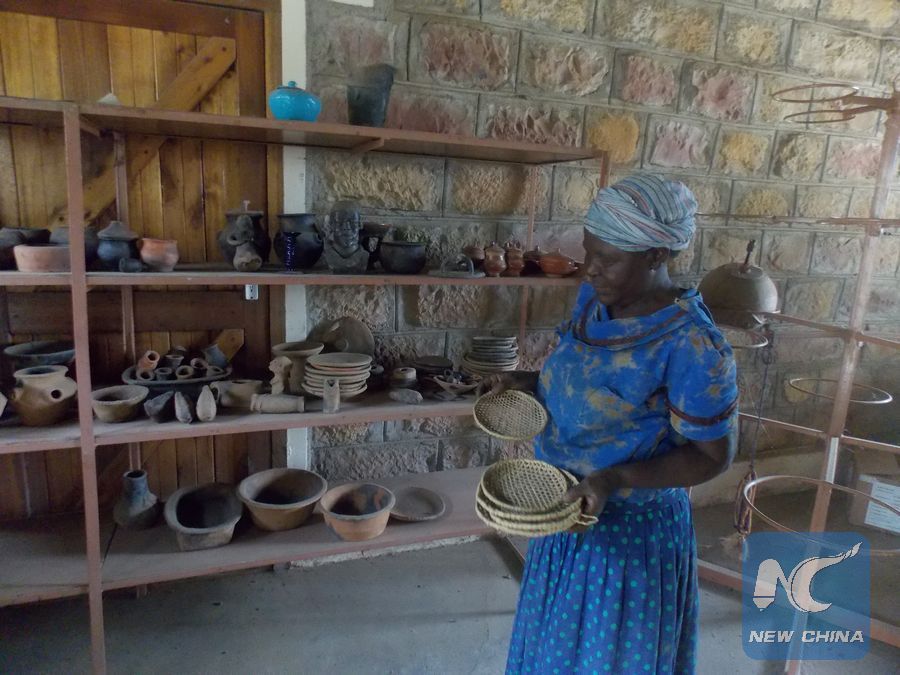
A local woman shows pot utensils made by Oriang Women Group in Homa Bay county, Nyanza Province, Kenya, Feb. 4, 2018. The kiln was constructed for Oriang Women Group by the German government through the United Nations Industrial Development Organization (UNIDO). However, the kiln is not in operation due to lack oil that fuels it. (Xinhua/Peter Mutai)
NAIROBI, Feb. 11 (Xinhua) -- Oriang Pottery Women Group in Homa Bay Country, Western Kenya, is home to water, cooking and plate pots that were used in the prehistoric times until the development of metal cooking utensils.
Founded in 1969, the group has remained relevant to keeping the traditional African utensils alive despite the introduction of new metal utensils globally.
"Water pots are still favored and are in high demand due to their storage power while most people purchase cooking pots because they heat up faster," Filgona Wanjara, the groups Chairperson told Xinhua in an interview.
Wanjara noted that their latest make -- fridge pot and jiko stove, are becoming very popular as people order for them as far as Nairobi, the capital city of Kenya.
She revealed that even though fridge pot takes too long to make, it is popular along the lake Victoria Basin and beyond as it helps keep drinking water cool during hotter months.
Jiko stoves are also gaining popularity as it enables families to use less fuel wood while cooking their food.
Wanjara said that their business thrives because plastic containers are unpopular with most people who claim that they do not keep water cool especially during hotter seasons.
Wanjara noted that their clients testify that foods cooked from the pot are better than the ones cooked in metal containers.
She noted that unknown to the current generation, food cooked in the pot continues being cooked even after being removed from the fire.
"Cooking from the pot takes some time but the foods are often well cooked," Rosa Ogero, a resident of Kendu bay town who uses cooking pots said.
Ogero said that even though modernity is forcing people to abandon some items, the use of pot utensils is still popular. "They are cheap, available and also does not disappoint," she added.
In making the pottery utensils, the group members first find special clay. The clay is collected fresh and wet from the banks of River Sare, 10 kilometers away, where they dig the soil and collect the clay and transport it to the group premises. Sometimes, during dry seasons they collect dry clay to which they add water to avoid dehydrating.
"We then blend the clay, smoothing and compressing it to what one intends to make after mixing it properly with water ready to form pottery," Jakoyo added.
The utensils are then allowed to dry for utmost two weeks, until it is properly dry to avoid cracks forming and then the women paddle the outside of the vessel with a flat piece of wood, mixed with some traditional concoctions that make the utensil durable.
"We then pile grass and use them for covering the pots and bury them in hot blazing fire," said Jakoyo.
The pots are then let to cool down completely before being moved from the ashes of the fire to avoid cracking.
According to Wanjara, the group members leave between 10-20 percent of the proceeds, depending on the number one makes in the group account.
"The amount is then used as a merry-go-round and often members borrow during emergencies such as falling sick," she added.
Wanjara said that with the use of jiko stoves, populations need to be encouraged to adopt its use to help save trees for fuel wood.
The group is currently involved in making flower pots and vase and they have orders mainly from Nairobi.

